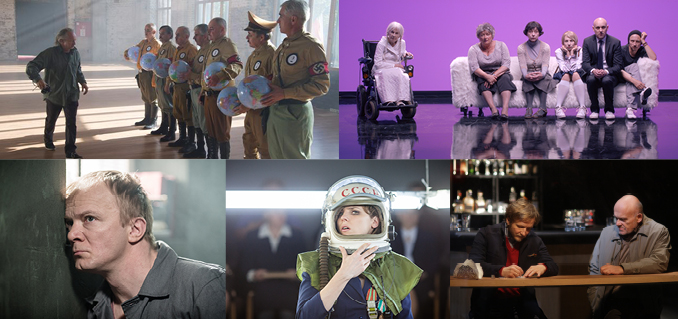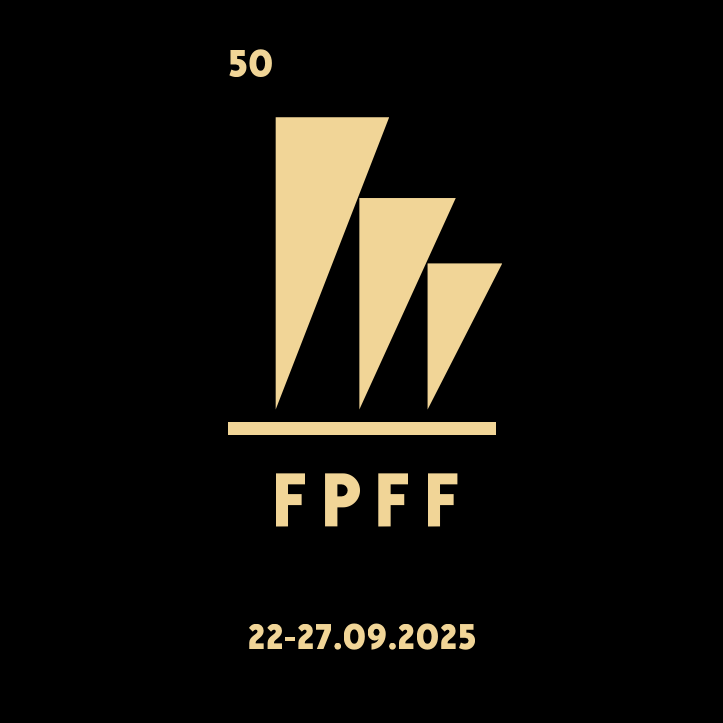The “Cinema Theatre” section at the 39. Gdynia Film Festival

The Cinema Theatre section of the Gdynia Film Festival presents the television theatre performances or new forms bordering on the television, film and theatre. Two performances entered the Cinema Theatre section of the 39. Gdynia Film Festival, presented under the patronage of their co-producer, the National Audiovisual Institute – “Między name dobrze jest” directed by Grzegorz Jarzyna and “Skutki uboczne” directed by Leszek Dawid. The Festival viewers will also familiarise themselves with the newest producing initiative of Wytwórnia Filmów Dokumentalnych i Fabularnych in Warsaw – a series of theatre performances made inside covered markets at Chełmska street and constituting an interesting artistic proposal of something between the film and the theatre.
“Między nami dobrze jest” is a film adaptation of one of the best performances of TR Warszawa. The play by Dorota Masłowska was directed – both on stage and in the film version – by Grzegorz Jarzyna, and exquisite roles were played by: Danuta Szaflarska, Aleksandra Popławska, Magdalena Kuta, Maria Maj, Adam Woronowicz, Rafał Maćkowiak, Roma Gąsiorowska, Agnieszka Podsiadlik, Katarzyna Warnke and Lech Łotocki. Radosław Ładczuk is the director of photography. The performance was produced by: TR Warszawa, Narodowy Instytut Audiowizualny, Fundacja Generacja TR Warszawa, and distributed by Stowarzyszenie Nowe Horyzonty. It is a tale full of grotesque dialogues comprised of perversely taken pop-culture quotes, mocks at the language of advertisements, magazines, tabloids and national stereotypes, treating of the Polish society of the transformation times. The main protagonists are the representatives of three generations of women, living below the minimum social level in a cramped Warsaw bedsitter. In her text, Masłowska has confronted different ways of thinking, views, systems of values and styles of expression, this way creating an explosive panorama of the Polish society.
“Skutki uboczne”, a play by Petr Zelenka, was directed by the creator of the cinema hit “Jesteś Bogiem”, Leszek Dawid. Krystyna Krauze is the author of the translation and Łukasz Gutt is the director of photography. The main roles will be played by: Anna Radwan, Krzysztof Stroiński, Adam Ferency, Magdalena Czerwińska, Bartłomiej Kotschedoff, Dawid Ogrodnik i Dorota Landowska. The protagonist of the performance is Jerzy, an outstanding photographer who one day agrees to make an advertising spot for a pharmaceutical concern. For the beginning advertising agency to receive the commission, intervention at the head of marketing of the company, a former friend of Jerzy, turns out to be crucial… Petr Zelenka asks the spectators fundamental questions in his play: does the contemporary man still have morality? How much, if anything, is he able to sacrifice in the name of the values declared? Is rebellion at all possible in the democratic system? And is it really true that morality exists independent of the political system?
“Skutki uboczne” produced by the National Audiovisual Institute and Telewizja Polska received Grand Prix at the Dwa Teatry Festival of 2014, in the “Best Television Performance ” category.
“Since the beginning of existence of the Institute, even under the name of Polish Audiovisual Publishing, theatre has been one of the main areas of activity of NInA. We support the Polish theatre stage – both in radio and in television, which translates into numerous jointly made performances of Teatr Telewizji and dramas of Teatr Polskiego Radia,” says Michał Merczyński, the Director of the National Audiovisual Institute. “We record the performances of outstanding Polish directors, Andrzej Wajda, Krzysztof Warlikowski or Grzegorz Jarzyna, which become new audiovisual pieces of art and receive another lives and new forms of distribution as well as, thanks to festival shows and internet shares for example via the Ninateka.pl portal, new audiences. I am glad that thanks to the Cinema Theatre section, we will be able to share our newest audiovisual co-productions with the film industry and the audience of the Gdynia Film Festival,” Merczyński said.
The second branch of the Cinema Theatre section is comprised of three performances made by Wytwórnia Filmów Dokumentalnych i Fabularnych in Warsaw: “Nad”, according to the text and directed by Mariusz Bieliński; “Walentyna” written by Julia Kijowska and Wojciech Faruga and directed by Faruga; and “Walizka” by Małgorzata Sikorska-Miszczuk directed by Wawrzyniec Kostrzewski. All the three performances were created within the “Teatroteka” project run by WFDiF and taken under the sponsorship of the Ministry of Culture and National Heritage. The adaptations made by young, often debuting filmmakers, with the support of the technologies and the film infrastructure, allow for the implementation of interesting, innovative works. The performances implemented are supposed to enter the mainstream of distribution. “It is the idea of the project to use the potential of the film technology for the adaptation of the most valuable achievements of the “young” Polish theatre dramatic art. During the last fifteen years, a new generation of authors writing for the theatre arose,” explains the Director of WFDiF, Włodzimierz Niderhaus. “They have created their own original language, manner of imaging, form, and they have also enriched the contemporary drama with the problems concerning the young people and their way of perceiving the reality around us. The “young” Polish dramatic art deserves its propagation and introduction to a wider audience – it is the main educational aim of the project.”
In the performances, we will see a whole pantheon of talented actors. The cast of “Nad” includes: Eryk Lubos, Henryk Talar, Sławomira Łozińska, Krzysztof Stroiński. The protagonist of the play is Jakub who has been convicted for a crime he did not commit. After twenty years, he regains freedom. But “freedom is the lack of mystery”. Jakub gets to know the identity of the only witness…
The title role in “Walentyna” is created by the co-author of the screenplay, Julia Kijowska. The protagonist of the performance is a famous Soviet cosmonaut – one of the most well known women of the 20. century and at the same time a mysterious figure. ““Walentyna” is an idea for releasing her story with the help of a unique theatrical form joining on stage a choir of female singers in the age similar to that of Walentyna and the actress,” the creators of the performance explain.
“Walizka” casts Adam Ferency, Krzystof Globisz, Halina Łabonarska and Marta Król in the main roles. The protagonist of the performance is a searcher of truth, Fransua Żako. Led by the Narrator and the Answering Machine, he goes from home to the Extermination Museum, where he recognises his father’s name on one of the suitcases from Auschwitz. “Walizka”, a poetic play of unusual construction, written in a distinct style, is a multifaceted tale about pursuing the truth, its healing power, about struggling with the past and discovering one’s identity. Based on a real story, it shows in an unusually poetic and abstract way the rebirth of the protagonist.
It is worth mentioning that the director of photography of “Nad” and “Walentyna” is Arkadiusz Tomiak, and of “Walizka” – Witold Płóciennik.
Michał Oleszczyk, the Artistic Director of the Gdynia Film Festival, emphasises the special role of the Cinema Theatre section in the following way: “All those performances, although very different as far as the tone and theme are concerned, prove the importance of the institution of implementing theatre performances in the form of films. Our traditions in this regard are just wonderful – I myself grew up with Teatr Telewizji, which has shaped the literary and theatrical sensitivity of Poles for decades. The five performances presented this year in various manners struggle with the problem of freedom, language and the battle of an individual for their own identity, and all this in the great artwork of directors and cast. This section really deserves attention.”

